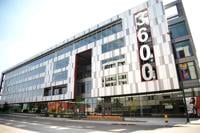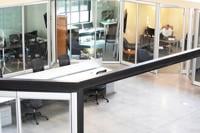When a cold warehouse building constructed on Brighton Boulevard in 1939 went on the market in the 2010s, commercial real estate investor Ben Woolf said he wanted the site as a way into the rising River North Arts District (RiNo).
With a new city zoning code and improvements being made to Brighton Boulevard, it was “clear” the center of gravity for Denver’s growth was shifting northeast of downtown into the trendy industrial neighborhood, he said.
The deal didn’t work out. Not for another decade, at least.
Another group of investors bought the industrial building and began converting it into an office in 2013. “Industry Denver,” as they called it, became one of the first large office developments in RiNo and city leaders called it a catalytic project for the corridor.
But recently, the building credited for spurring office growth in the neighborhood has been under financial trouble. It went into receivership after New York-based Clarion Partners, which took an ownership stake in Industry Denver in 2015, failed to pay off its loans in time. About half the building was vacant, Woolf said.
When the building was up for sale again, Woolf of Boulder-based Conscience Bay Company said his opinion of RiNo hadn’t changed much despite the building’s recent struggles and the pandemic’s havoc on the office market.
The investment firm Woolf cofounded announced it acquired the office building for $19 million earlier this month and renamed it “Fabrica RiNo,” taking inspiration for the Latin word meaning factory or workspace.
“It’s going to continue being a growing market,” Woolf said, noting the high concentration of apartments around the site.
The building was in good condition and “we just see everything in here has a lot of life left in it,” he said.
This time, Woolf said, there’s no loan on the property or a lender to keep happy. And with the firm’s “long-term ownership” investment strategy, there’s no rush to turn a quick profit.
“We don’t have a closed-end fund where we have to sell after five or seven or 10 years,” he explained. “We can really have a more open plan.”
Conscience Bay Company recently completed the purchase of RiNo neighborhood office building, Industry Denver, as seen on Tuesday, Sept. 10, 2024.
Tom Hellauer/Denver Gazette
A flood of new offices
Since Industry Denver was built, the office boom in RiNo hasn’t stopped.
Like downtown Denver, which has about a third of its office buildings empty, RiNo saw the number of office spaces available rapidly rise since the pandemic as employees shifted to remote/hybrid work and companies left or downsized their spaces when leases came up for renewal.
The problem is exacerbated in RiNo, which has the highest office vacancy rate in the Denver metro area, according to the second quarterly office report from commercial real estate firm CBRE released in July.
Nearly half of the neighborhood’s offices are empty, or 49%, the report found.
While downtown struggles with too many old office buildings, RiNo has the opposite problem: too many new ones.
But that’s not stopping buildings from rising.
Currently, most of the construction activity in the metro area (which has fallen to an 11-year low, according to another office real estate report from JLL) is happening in the artsy-industrial neighborhood north of downtown with more than 362,000 square feet under construction during the second quarter in RiNo. Denver in total has 627,000 square feet of projects in the pipeline, according to CBRE.
Cherry picking: Cherry Creek draws employers from Denver downtown
The second busiest market is Cherry Creek, which has one of the lowest vacancy rates at 10%, with about 140,000 square feet in development (not including the massive Cherry Creek West development just approved for rezoning).
RiNo only began being considered a serious office market within the last decade, said Nic Weld, CBRE’s senior vice president of advisory and transaction services in Denver. Cherry Creek is more mature and many tenants have been there for a long time, he said.
Currently, RiNo’s market is feeling “a lot of pain” because of the flood of new construction, Weld explained. But it also has the most popular qualities companies are currently looking for in an office and its surrounding neighborhood.
It’s a mixed-use atmosphere filled with coffee shops, restaurants, bars, transit options and housing. And about 70% of its offices are Class A construction — the newest and highest quality offices on the market, Weld said.
FILE PHOTO: Dozens gathered for the unveiling of a new mural to commemorate Denver’s sister city Chennai, India at a ceremony in the River North Arts District on Thursday, July 18, 2024. RiNo was a former industrial area, now popular for new office developments because of its artsy dining and living scene.
Tom Hellauer/Denver Gazette
These are some of the same ingredients that have made Cherry Creek successful.
But the submarket south of downtown also has smaller buildings with already established tenants, requiring less work to fill. The similar market north of downtown is building bigger offices and owners have to fill them from scratch, Weld said.
“It’s hard to compare a brand new market that was industrial as of 10 years ago to a market that’s been around for many decades,” Weld said.
Another factor is the industries each submarket attracts. RiNo became a popular home for technology, creative and media companies because of the neighborhood’s arts district roots, especially businesses from core tech cities such as San Francisco, New York or Chicago looking to relocate or set up a Denver presence, Weld said. But the tech industry has seen investments dry up and many layoffs during this economic cycle, slowing demand since pre-pandemic.
“You have lots of brand new product delivering at the same time where the demand has also shrunk,” Weld said. “Particularly for those industries that are probably the best candidates for taking space out there.”
But once the dust settles on the pandemic’s economic shakeup and companies feel more confident to expand, where are they going to look around Denver?
Likely RiNo.
“RiNo is where your stock of new construction assets are,” Weld said. “If you’re moving people from San Francisco or New York, there they tend to gravitate toward that flight-to-quality of those Class A assets that are highly amenitized. And that’s where that product is.”
While it may time to recover, he added, long-term RiNo has “real potential.”
Glass half empty? Or half full?
RiNo’s skyline has been filled with cranes over the past few years, said Brian Fitzpatrick, construction firm Mortenson’s Denver general manager.
In early 2023, according to CBRE, there was nearly 1 million square feet in office development in RiNo with the largest projects expected to be completed before 2025.
Despite the high vacancies, it hasn’t stopped notable new leases from being signed in the area.
Last year, Colorado’s largest natural gas and energy provider Xcel Energy announced it was moving its headquarters into T3 RiNo, leasing more than 220,000 square feet of office space as the building’s sole tenant. The utility company is set to relocate in 2025.
At the time, a company spokesperson said the move would “reduce the company’s annual operational costs by an estimated $2.5 million.”
Success! Thank you for subscribing to our newsletter.
Metro Moves: RiNo office to be converted to retail
Paradigm River North, an eight-story office at 3400 Walnut St. finished construction in May and signed a pre-lease with law firm Davis Graham & Stubbs LLP to take the top three floors. The building has a two-story lobby, tall 12-foot ceilings and outdoor space on every floor with views of downtown and the Rocky Mountains. It also has a gym, bike storage and showers for workers in the building to use.
When developers Jordon Perlmutter & Co. and Rockefeller Group announced Paradigm River North’s completed construction, Newmark leasing advisor Jamie Gard stated the office was finding success in targeting clients on both “ends of the spectrum” who want either several floors or a small suite.
The largest new occupant in the second quarter in the metro Denver market moved to RiNo, according to CBRE. It was EW Scripps Co., which took two floors of Junction 23 at Denargo Market. New constructions significantly helped Denver’s office market last quarter see net positive absorption — when companies lease more offices than vacate them — for the first time since 2022.
Meanwhile Rev360, an office building on 3600 Brighton Blvd., has been waiting four years for a single tenant since finishing construction in 2020.
It’s back on the market after selling for $72 million in 2021 at an “incredible discount,” according to the listing. While there’s no asking price listed, it’s on the market for less than it was built for.
Now there’s more buildings on the market for Rev360 to compete against for tenants.
Rev360 in Denver’s RiNo neighborhood on Tuesday, Sept. 10, 2024.
Tom Hellauer/Denver Gazette
National construction firm Mortenson is building a new 65,000-square-foot office complex in RiNo to serve as the headquarters for its Denver operations. It’s set to be completed by the end of this year.
Mortenson’s project is hitting the market at the same time as many others in the area, Fitzpatrick said.
The company’s current offices are in downtown across from Union Station, but Mortenson plans to leave so it can be the owner of its own office space, rather than a renter, Fitzpatrick explained.
Empty land is hard to come by downtown, he said. RiNo had more opportunities.
Plus, RiNo offers more of the live-work-play lifestyle Cherry Creek North is popular for at the “right price point,” he said.
“RiNo’s got a great energy to it and is only going to continue to get better,” Fitzpatrick told The Denver Gazette.
As COVID shifted the relationship between workers and the workspace, Fitzpatrick said the project gave them a “blank slate” to curate the office as they needed it.
With new construction, most office buildings have to worry about filling it with tenants. Mortenson’s project is a unique case because the developer will be its own tenant for nearly half the four-story building, Fitzpatrick said.
A rendering of Mortenson’s new Denver headquarters under construction in RiNo.
Courtesy photo, Mortenson
The company took into account COVID’s effects on the workplace and leaned toward a “boutique,” or smaller-sized, office to have less space to find tenants to fill, he said.
“We were really careful about not trying to do too much and take on more than we could chew because of the uncertainty of COVID and how things were going to play out,” Fitzpatrick said. “What we would be looking to fill is a pretty small portion of the building that felt pretty manageable from a business standpoint.”
With the “collision” of new offices and the pandemic, Fitzpatrick said it’s going to take time for companies to get comfortable with the cultural change, tense financial markets and with where the neighborhood is going.
“Nobody’s holistically landed on what that looks like these days with remote working and flexible working and hoteling,” Fitpatrick said. “Once people start to really figure that out and dial it in, there’ll be more action.”
Despite the uncertainty, the company still feels confident about RiNo’s future.
“We wouldn’t be there if we didn’t feel good that there was going to be a pretty viable neighborhood with a lot of people around,” he said.
Conscience Bay Company recently completed the purchase of RiNo neighborhood office building, Industry Denver, as seen on Tuesday, Sept. 10, 2024.
Tom Hellauer/Denver Gazette
Filling the other half
When walking around Fabrica RiNo, it was quiet and few people were in the office. The cafeterias were pristine and clean, without a person in sight. Ping pong tables sat un-played. Many conference rooms, small office spaces and hotel desks were empty.
But Woolf expected some workers to return with school back in session and vacation season ending.
“It’s a little busier post Labor Day, I think,” Woolf said. “Summer’s over and everyone’s got to get back to the office.”
Like the rest of RiNo, Woolf has to contend with how to lease the empty second half.
A worker sits in his office in the RiNo neighborhood office building, Industry Denver, on Tuesday, Sept. 10, 2024.
Tom Hellauer
[email protected]
The building saw tenants leave during the pandemic and also when it went under receivership, Woolf said, as companies with expiring leases didn’t want to risk staying amidst Industry Denver’s struggles.
Woolf said Fabrica RiNo’s rebrand hopes to help separate the building’s image from its past issues and also differentiate it from another office building nearby named Industy RiNo Station.
The building is currently home to 20 businesses including Core Power Yoga, Will Call and is the headquarters of Denver breakfast chain Snooze A.M.
Conscience Bay Company plans to remove most of its hotel desks after not seeing much demand from single business owners and turn the space into “soft-seating.” It could become an arcade, Woolf said, or a living room-style break area.
Consciouse Bay Company’s Ben Woolf at Industry Denver, now called Fabrica RiNo, as seen on Tuesday, Sept. 10, 2024.
Tom Hellauer / The Denver Gazette
Fabrica RiNo will be more “hospitality” focused, Woolf said, as the creative industries they’re looking to attract value hotel amenities in their offices. The building also hopes to attract restaurants who need a corporate location with a test kitchens. Both Snooze A.M. and Modern Market Eatery have a test kitchen to experiment and develop new menu additions in Fabrica RiNo, Woolf said.
He also said they hope to poach some companies downtown who are considering shrinking their offices.
“That’s kind of a compelling value that we can provide, but that would have been pre-COVID or post-COVID,” Woolf said. “That hasn’t really changed.”
Looking around the neighborhood the investment firm waited more than a decade to enter, a lot of RiNo’s problems come down to bad timing.
“Without COVID, the office market would look very different here,” Woolf said. “A lot of the things that were driving the development of those office buildings would have come true.”
And it still can, he said.
“Our view on it is, though, that this is just delayed. That 50% vacancy is not a permanent feature of RiNo.” Woolf said. “Those offices will get leased up at some point.”
Copyright for syndicated content belongs to the linked Source link



























